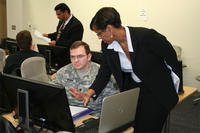Move. Certify. Repeat. State requirements can create career obstacles for relocating military spouses.
Maggie Smith begins with an admission. "I don't think I have the worst-case story," she says of her struggles to find a new job whenever her family received permanent change of station orders. She's moved four times in six years with her Coast Guard husband -- and has had to start over in her chosen field of special education every time.
Her experience varied wildly from state to state. Florida was "a piece of cake," Smith says. "They cashed my check and said, 'Here's your certificate.' "
Moving to New Jersey was another story. "One of my biggest issues was trying to get things done ahead of time so that when I interviewed for jobs I could say that I was already certified there," she says. "And what I ran into was a huge wait list for certification."
A year later, Smith was granted a "provisional" certification, which meant she'd have to enroll in state-sponsored teacher orientation classes, despite her five years of teaching experience in her home state of Maine. "I'd work all day, then have to drive an hour to sit in a class for three hours to cover topics that I'd already been doing for a number of years," she says. Lessons included things such as how to run parent-teacher conferences and put together a grade book. "I don't want to say it was a waste of time for everyone -- but it was definitely a waste of my time."
When PCS orders arrive, many spouses must uproot careers and find new jobs in their new states, or face the option of staying in their current positions even if that means being separated from their relocated spouse. That is what happened to Cara Baltazar. Her husband is stationed in Alaska. She, however, lives nearly 4,000 miles away in Arkansas, where she teaches kindergarten in a public school.
"It's just for the financial purposes of having a job," she says. "To move to Alaska and get a license there would cost just over $1,000 for two online classes required by the state -- plus an additional $200 for a license. When you're moving every two years, $1,000 every two years really adds up."
Military spouses move across state lines 10 times as often as civilian spouses, according to a 2012 joint report from the Defense and Treasury departments. That constant churn is why military spouses are encouraged to find portable careers. Yet many of the most portable jobs come with a catch: You need to be state-certified to work in the field, and for many spouses, that turns out to be a recurring nightmare. It is little wonder that more than one in four military spouses are currently unemployed, the report noted.
The Defense Department has taken notice of the issue, and its state liaison office has begun working with state legislatures to enact laws to at least lower the hurdles military families face when moving to a new state. Even so, about half of the states have yet to pass favorable military spouse credentialing legislation, according to the DoD's USA4MilitaryFamilies website.
Dealing with Recurring Moves
The top three jobs occupied by military spouses, according to recent U.S. Census data, are K-12 teachers, child care workers and registered nurses. "All three of those require licensing across state lines," notes Vivian Greentree, director of research and policy for Blue Star Families, which has collected stories of relocating spouses facing licensing and credential issues. In all, the joint government report shows, 34% of military spouses are in fields that require them to be fully licensed.
"Military spouse education and employment consistently ranks in the top five issues that concern military families," as surveyed by Blue Star, says Greentree. Job markets, child care and challenges with state licensing are all among the main worries.
Consider the experience of Stephanie Cutlip, who obtained her master's degree in education from Liberty University in Virginia, before her Marine Corps husband was transferred to California. She never taught in Virginia, however, because she said the licensing requirements were too onerous. Instead, she figured, she'd find a job once she knew to what state they'd transfer.
When she heard about her husband's PCS in May, she dutifully filed paperwork to become certified in California -- only to be told three months later that because she earned her degree in a state where she never taught, she can't teach in California unless she completes additional course work there. "I have a $90,000 paper that I can do absolutely nothing with," Cutlip notes. "I'm working at the child development center on base, getting paid the same as an 18-year-old who just got their diploma, just to be able to pay off my student loans."
Christina Actis, meanwhile, has reluctantly chosen to put her career on hold after several interstate moves made it too difficult to keep up her teaching credentials. "I hate to say that we're giving up a lot to follow our servicemembers," she says. "I'm fortunate that I can stay home with my girls right now before I can get back and pursue my goals." Once her children are in school full time, she says, teaching will ultimately "be the best career for us." Provided, that is, that she can find a job and obtain credentials in their next state.
Pentagon Working with States
The DoD and Treasury joint report identified three best practices for states seeking to help employment of military spouses: facilitating cross-endorsement of out-of-state licenses; issuing temporary licenses to give people time to work through state paperwork; and expediting procedures so that applicants can simply attest they'll provide any supporting documentation later on. The push actually began two years ago, says DoD State Liaison Office Chief Marcus Beauregard. "We are not looking to lower any standards that the state may have, or to get concessions so that military spouses don't have to comply with standards," he says. "We're finding ways that they can expedite."
Colorado passed legislation allowing spouses to have their out-of-state credentials endorsed even if they don't have recent work experience, while Florida created temporary licenses that give spouses six months to get their credentials in order after arriving in the state. During the final presidential debate, President Obama called out the efforts of the Joining Forces organization, led by Michelle Obama and Jill Biden, which helps veterans and their spouses find work and overcome certification issues. After the first lady's office brought the issue to the attention of state Senate President John Cullerton, Illinois passed six-month temporary licenses.
Untangling each state's laws remains a knotty problem, says Beauregard: "You've got 50 states with maybe 70 or so occupations in each state, and each of those occupations have their own requirements." In particular, teachers and lawyers aren't covered by most credentialing laws. "Teachers come under the state board of education, so that's a whole different set of rules."
If your new state has yet to pass a new law covering spouse credentials, Beauregard says, legislators need to hear from you. The USA4MilitaryFamilies site includes a page on spouse licensure and provides space for feedback. "If we're putting together some legislation, the most profound thing that can help that process is to hear the testimony of a spouse who has had to deal with those circumstances," he says. "It's not just our liaison talking statistics -- it's visceral at that point."
For now, military spouses are left hoping for legislation that will make it easier to follow servicemembers to new assignments without giving up their own careers. "In a dream world, there would just be a national certificate that would transfer anywhere," says Smith.
-----
Tips for Relocating Spouses
While there's no magic bullet for easing the transition to a new state, USAA Certified Financial PlannerTM practioner J.J. Montanaro says it always helps to be prepared. "Know what you're up against and get a jump on it," he says. "Build up a cash cushion so that if there is a gap in time, you have some cash to help fill the gap." Beyond that, military spouses who've been through the recertification wringer have their own advice to pass along:
- Stay organized. "Keep a folder with your notes and names of people you spoke to and what day," says teacher Maggie Smith. "Don't let this certification lapse -- especially certifications that you currently hold. You definitely don't know when you're going to end up back in that state."
- Don't delay. "The minute you find out, I think you need to start," says nurse Melissa Rothenburg. "Even just check the requirements, and see everything that's needed."
- Remain flexible. "Don't just say, 'I have to have this 9-to-5 job,' " cautions engineer Natalie Williams. "Look to get experience where you can." Freelance work can provide a temporary lifeline, she says, something she's accomplished through contacts from her old employer in her previous state.
- Be persistent. "Don't roll over, and if somebody tells you no, there's always a way to do what you want to do," advises teacher Christina Actis. "I think being married to a servicemember, you lose your identity a little bit. So it's good for spouses to know to keep pursuing their dreams."























